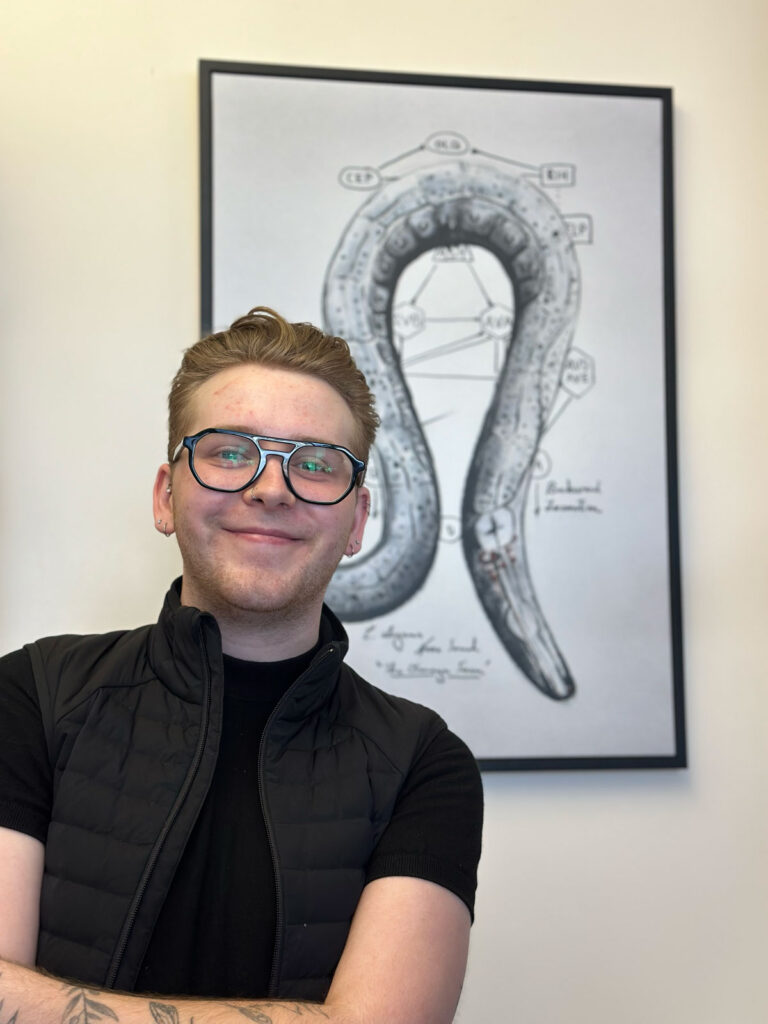
“I think I can make the biggest impact on medicine through research and through teaching students who will go on to become doctors. I want to be able to share my philosophy of how everyone should be treated and how much diversity should be valued. I see that as my way to impact medicine.”
In May 2024, Kaden Wall will be the first in his family to earn an undergraduate degree (and he paired this with an MS too!). Armed with knowledge and a passion for science and academia, Kaden has his sights set on graduate school and earning a PhD.
After transferring from Salt Lake Community College, one of Kaden’s first biology classes at the U was “Introduction to Cell Neurobiology” (BIOL3240), taught by Sophie Caron, PhD. Not only was the science exciting, but Kaden describes Dr. Caron as someone who doesn’t fit the fixed stereotype many people have of physicians and scientists. In Dr. Caron’s class, Kaden says it was incredibly “cool to learn alongside students who come from diverse backgrounds.” Seeing Dr. Caron prioritize diversity and inclusion in the classroom was an amazing and transformative experience for Kaden, who initially planned to pursue medical school. “I think I can make the biggest impact on medicine through research and through teaching students who will go on to become doctors. I want to be able to share my philosophy of how everyone should be treated and how much diversity should be valued. I see that as my way to impact medicine.” As a member of the LGBTQIA+ community, Kaden often ponders the challenges of advancing diversity and inclusion, and, thanks to Dr. Caron, sees research and teaching as one of the areas where you can have a lasting impact on society.
Kaden’s academic and career goals were first inspired by exceptional and caring instructors and furthered by taking a deep dive into biology through neuroscience research. Kaden summarized his research with the skill and passion of a future professor: “Your ability to talk, walk, write, and read this paragraph is all attributed to the molecular mechanisms occurring at one specialized region of a neuron, the synapse. Using the humble soil nematode—C. elegans, I study the molecular mechanisms that regulate synaptic vesicle loading and checkpoints for docking and fusion.” How neurons transmit signals to other neurons and other cells is a vibrant area of research important to advancing our understanding of how the brain works, and how disease processes such as Alzheimer’s, disrupt signals in the brain. As an undergraduate, Kaden has had a tremendous learning experience, working hands-on, in the laboratory of Distinguished Professor and Howard Hughes Medical Institute Investigator, Erik Jorgensen, PhD.
Kaden offered this advice to current and future undergraduates in biology and STEM: “A lot of times when you're wrong about something you learn the most. Not being afraid of being wrong provides an opportunity to learn from the people around you.”
By Maisy Webb
You can email us at sbs-media@biology.utah.edu with questions, ideas, or to suggest a student story!
